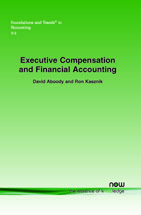Executive Compensation and Financial Accounting
By David Aboody, Anderson Graduate School of Management, University of California at Los Angeles, USA, david.aboody@anderson.ucla.edu | Ron Kasznik, Graduate School of Business, Stanford University, USA, kasznik_ron@gsb.stanford.edu
Abstract
In this monograph we provide research perspectives on the relation between executive compensation and firms' financial reporting and disclosure policies. In particular, we examine the two primary contexts in which this relation has been examined in the extant literature. The first issue we examine is the extent to which the structure of executive compensation plans, particularly the use of earnings- and stock-based compensation, induces certain financial reporting and disclosure choices. The second issue we examine is the extent to which accounting regulation related to financial reporting and income taxation creates incentives for firms to design certain compensation plans for their executives. We highlight the key inferences from these areas of research and offer some suggestions for the development of a more integrated research agenda.
Executive Compensation and Financial Accounting
Executive Compensation and Financial Accounting provides research perspectives on the interface between financial reporting and disclosure policies and executive compensation. In particular, it focuses on two important dimensions: the effects of compensation-based incentives on executives' financial accounting and disclosure choices, and the role of financial reporting and income tax regulations in shaping executive compensation practices.
Executive Compensation and Financial Accounting examines the key dimensions of the relation between financial accounting and executive compensation. Specifically, the authors examine the extent to which compensation plans create incentives for executives to make particular financial reporting and disclosure choices. They also examine the extent to which accounting regulation creates incentives for firms to design particular compensation plans for their executives.
